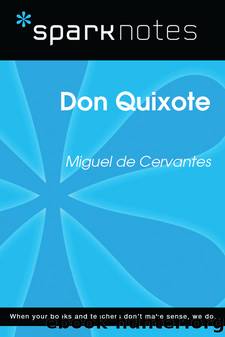Don Quixote: SparkNotes Literature Guide by SparkNotes

Author:SparkNotes [Sparknotes Editors]
Language: eng
Format: epub
Tags: Study Guides
ISBN: 9781411474857
Publisher: Spark
Published: 2014-09-10T00:00:00+00:00
Chapter XV
Sampson reveals that he has been plotting with the priest and the barber to vanquish Don Quixote and to order him to go home for two years. Samsonâs squire leaves him, but Samson vows revenge on Don Quixote.
Analysis: Chapters VIIIâXV
Sanchoâs trickery in the incident with the peasant women and Sampsonâs deception about his identity emphasize the willingness of Don Quixoteâs peers to engage him in his world of deception and fantasy. Sancho is motivated by self-interest, whereas other characters play along due either to a desire to help Don Quixote or a need for a diversion. In all cases, Don Quixoteâs imagination shapes the novelâs plot. Don Quixoteâs dreams direct the actions of other characters, just as they do when Dorothea pretends to be a princess in the First Part. This playfulness influences the charactersâ interactions with Don Quixote throughout the remainder of the novel.
The costumes worn by the actors on the wagon and by the Knight of the Mirrors show that the physical world has begun to imitate Don Quixoteâs fantasies. Previously, Don Quixote misperceives everything around him, seeing windmills as giants and prostitutes as princesses. Now, however, the physical world has become difficult for anyone to define clearly. Rocinante, mistaking the costumed actor for an apparition, is terrified. Moreover, the Knight of the Wood becomes known as the Knight of the Mirrors in the middle of the chapter due to his change in appearance. Cervantes now mixes reality with elements of deception, which validates Don Quixoteâs misperceptions and makes him seem more sane. Whereas earlier it is easy to perceive Don Quixote as insane, it now seems that the world around him is illogical. As a result, Don Quixote becomes more of a driving force in the novel, almost as though his fantasies have begun to dictate the course of the physical world around him.
Cervantes brings up religion by mentioning Benengeliâs praise of Allah and Sanchoâs suggestion that he and Don Quixote try to become saints. The novel repeatedly touches on the importance of being a Christian in Cervantesâs Spain. Cervantes often brings up religion in reference to Sancho, who Cervantes says is an old Christian and whose wise aphorisms often stem from Christian sources. The captiveâs earlier tale about the Moor Zoraidaâs passionate longing to convert to Christiantity and subsequent baptism makes Zoraida appear to be a good and beautiful woman. This depiction of the essential goodness within Zoraida despite her Moorish heritage contrasts with Cervantesâs and his charactersâ dismissal of her Moorish countrymen as liars and cheats. Moreover, in the discussion on the way to Chrysostomâs funeral, in Chapter XIII, Don Quixote compromises his extreme faith in chivalric traditions in order to allow knights-errant to praise God. Christianity, then, unlike most of the social customs of the times, receives a positive and somber treatment in the novel and stands alone as the one major subject Cervantes does not treat with a mordant, ironic tone. Here, at the beginning of the third expedition, Cervantes treats Christianity with more reverence than at any other point in the novel.
Download
This site does not store any files on its server. We only index and link to content provided by other sites. Please contact the content providers to delete copyright contents if any and email us, we'll remove relevant links or contents immediately.
Pale Blue Dot by Carl Sagan(5007)
Cracking the GRE Premium Edition with 6 Practice Tests, 2015 (Graduate School Test Preparation) by Princeton Review(4291)
Pocahontas by Joseph Bruchac(4259)
Unfiltered by Lily Collins(4003)
The Emotionary: A Dictionary of Words That Don't Exist for Feelings That Do by Eden Sher(3363)
The Daily Stoic by Holiday Ryan & Hanselman Stephen(3317)
The 48 laws of power by Robert Greene & Joost Elffers(3291)
Factfulness_Ten Reasons We're Wrong About the World_and Why Things Are Better Than You Think by Hans Rosling(3237)
The Innovators: How a Group of Hackers, Geniuses, and Geeks Created the Digital Revolution by Walter Isaacson(3206)
The President Has Been Shot!": The Assassination of John F. Kennedy by Swanson James L(3101)
Sapiens and Homo Deus by Yuval Noah Harari(3071)
Rogue Trader by Leeson Nick(3043)
Gettysburg by Iain C. Martin(2834)
The Rape Of Nanking by Iris Chang(2822)
Almost Adulting by Arden Rose(2709)
The Plant Paradox by Dr. Steven R. Gundry M.D(2620)
In the Woods by Tana French(2598)
500 Must-Know AP Microeconomics/Macroeconomics Questions(2572)
Make by Mike Westerfield(2319)
